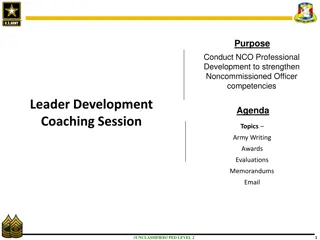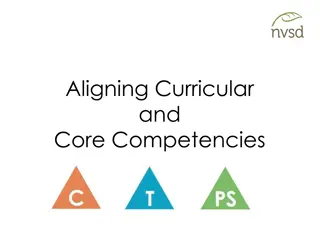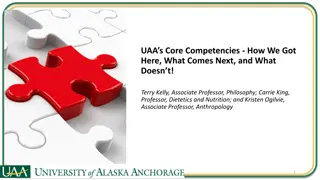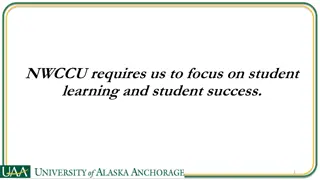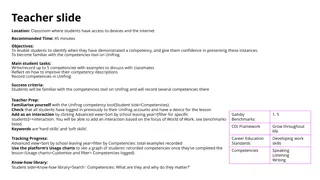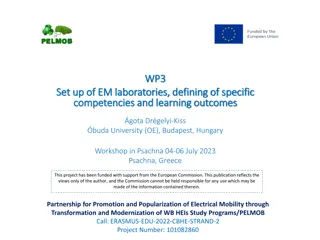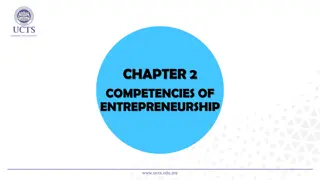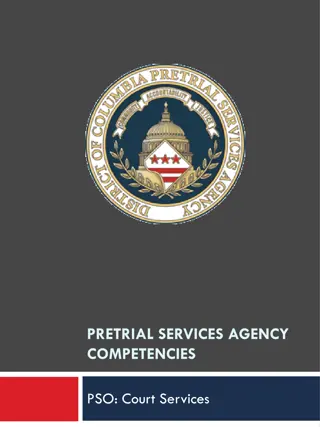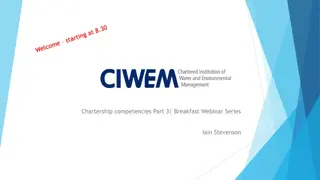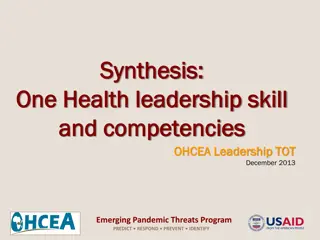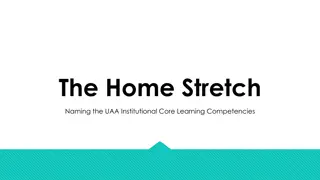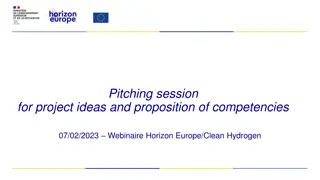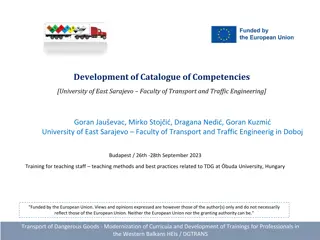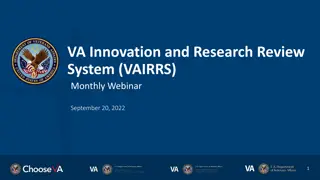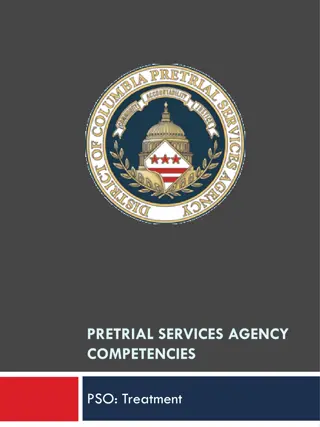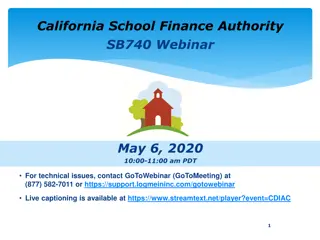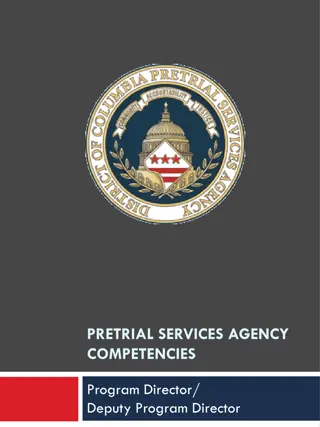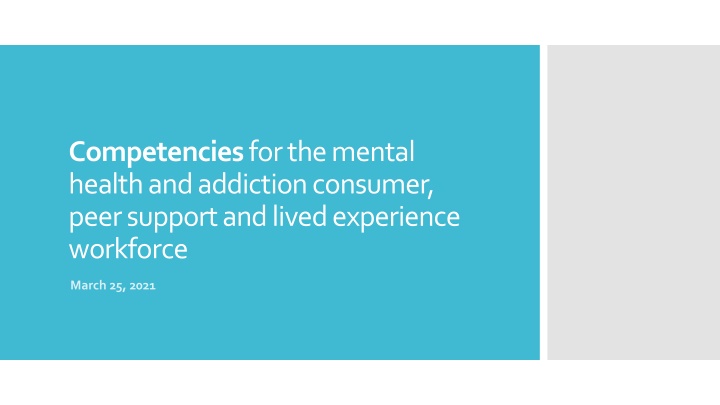
Competency Frameworks for Mental Health and Addiction Support
Explore the competencies needed for mental health and addiction consumer support through peer experiences. Learn how competency frameworks enhance understanding and skills, and discover the values essential for effective support.
Download Presentation

Please find below an Image/Link to download the presentation.
The content on the website is provided AS IS for your information and personal use only. It may not be sold, licensed, or shared on other websites without obtaining consent from the author. If you encounter any issues during the download, it is possible that the publisher has removed the file from their server.
You are allowed to download the files provided on this website for personal or commercial use, subject to the condition that they are used lawfully. All files are the property of their respective owners.
The content on the website is provided AS IS for your information and personal use only. It may not be sold, licensed, or shared on other websites without obtaining consent from the author.
E N D
Presentation Transcript
Competenciesfor the mental health and addiction consumer, peer support and lived experience workforce March 25, 2021
What is a competency framework? Why are they useful? Background First competency framework
The Refreshed Framework
Peer support workers (peer navigator, peer recovery coach, peer recovery guide, peer mentor, voice worker or peer support specialist .) Consumer advocates Consumer advisors Who is it for? Consumer, peer and service user educators Consumer, peer and service user researchers and evaluators Consumer, peer and service user auditors Service user, consumer and peer supervisors
Essential People need to demonstrate this level of competency when they start their job. Enhanced At the enhanced level people need to demonstrate a higher level of understanding of the competency. 3 levels Leader Leaders and influencers need to demonstrate this level of competency. Anyone + Essential / sometimes Enhanced
Essential: Understands how to use mutuality in peer relationships Enhanced: Works with people using mutuality Example across levels Leader: Shows and promotes mutual and authentic relationships in their organisation and with stakeholders.
Sharing common experiences and being authentic in our relationships. Value: Mutuality
Valuing what we have learnt from our life experiences. Value: Learning from Experience
We value the right of people to participate in their treatment, and in the delivery of services. Value: Participation
Valuing the right of people to make their own choices, without any pressure from others. Value: Self- determination
Treating people fairly, without discrimination. Value: Equity
Believing that there is always hope, and that resilience and wellbeing are possible for everyone Value: Hope & Wellbeing
Our values of participation, self- determination and equity are rooted in values from Te Tiriti o Waitangi. Values & Te Tiritio Waitangi K wanatanga Tino rangatiratanga ritetanga Wairuatanga
THE CORE PEER COMPETENCIES APPLY TO ALL ROLES 1) Applying lived experience 2) Wellbeing and Resiliency 3) Learning and Professional Development 4) Communicating Effectively 5) Interacting with family, wh nau and community 6) Interacting within teams and systems 7) Using a human rights approach Specific Competencies Peer support workers Consumer advisors 1. 2. 3. Mutual relationships Purposeful approach Peer support practices 1. 2. 3. Strategic viewpoint Participation and leadership Service improvement
Essential level Understands: o how lived experience connects people. o how to share relevant experiences to contribute to the peer relationship o How sharing your own experience can have an impact on you and on other people, and how to manage this. o how to listen with empathy when peers discuss their experience, and not judge. o how to help people feel safe and secure when sharing their experience o trauma-informed care o how to show hope and express hope for others. o realistic optimism. o The idea of mutuality, especially that mutuality requires different boundaries from the clinical workforce Core: Applying Lived Experience
Essential level Understands: o Self-care and stress management practices o wellbeing and resilience principles and how to apply these. o their personal strengths and challenges relating to work o how to self-advocate for what they need to maintain their health and resiliency o strategies for handling stressful or challenging situations o trauma informed care o the impact of trauma on themselves and others o Seeks support and/or supervision (including cultural supervision) when challenges might impact on their work and wellbeing Core: Wellbeing & Resiliency
Core: Learning & Professional Development Essential level Develops a professional development plan. Networks with other members of the peer workforce. Seeks mentoring and support from a peer.
Essential level Understands: o Communicating respectfully using recovery and wellbeing focussed language o active listening skills and communicating with empathy o the boundaries for our role and how to work within them (role clarity) o coping well with challenging situations o working collaboratively with others Demonstrates ability in communicating with people from various backgrounds, cultures, age groups, etc. Can engage in karakia Core: Communicating Effectively
Essential level Demonstrates understanding about: o the diversity of family/wh nau and friends, and the different roles they have for people. o different communities people belong to such as cultural, spiritual, religious, sexuality, gender and interest groups o the differences between family of choice (including friends and partners) and genetic family ties. o the impact of mental health and addiction on families/wh nau and communities o How a person s culture or age might influence practices/expectations around privacy (e.g., when working with teenagers, parents or with wh nau groups). o Tikanga, cultural values and beliefs o Different approaches to wellbeing. Can describe their own culture and what diversity means to them. Identifies community services and resources. Seeks cultural support and advice when needed. Identifies relevant community and whanau hui. Core: Interacting with Family, Whanau and Community
Essential level Understands: common mental health and addiction treatments, supports and services. Core: Interacting with teams and systems legislation, policies and standards relevant to their work. the roles and responsibilities of colleagues how to use peer values and relevant policies to make ethical decisions the value of having people with lived experience involved at all levels of the organisation.
Essential level: Demonstrates understanding about: o human rights approaches and why they are used. o The impact of relevant United Nations documents within mental health and addiction work, including: United Nations Convention on the Rights of Persons with Disabilities (UNCRPD) United Nations Declaration on the Rights of Indigenous People (UNDRIP) United Nations Convention against Torture and other Cruel, Inhuman or Degrading Treatment or Punishment. o Their organisation s complaints process. o what stigma, discrimination, prejudice and human rights breaches are. o why some people may need support and advocacy to protect their rights. Core: Using a Human Rights Approach
1. Peer support - mutual relationships Peer support relationships are always developing and involve both people giving and receiving. Peer support workers understand this concept of mutuality and they use it in their relationships Specific: Peer Support Workers 2. Peer support - purposeful approach Peer support workers understand people need to have hope, meaning and aspirations in their lives. They support them to achieve this. 3. Peer support - peer support practices Peer support workers understand what peer support is and use appropriate models, tools and practices in their work.
1. Consumer advisors - strategic viewpoint All consumer advisors work strategically to effect positive change in service delivery and organisational culture. 2. Consumer advisors - participation and leadership All consumer advisors ensure that effective peer participation and leadership happens at all levels of the organisation. Specific: Consumer Advisors 3. Consumer advisors - service improvement Consumer advisors are involved in service improvement, quality improvement, and education. They promote meaningful wellbeing-focussed measures for people who use services.
THE CORE PEER COMPETENCIES APPLY TO ALL ROLES 1) Applying lived experience 2) Wellbeing and Resiliency 3) Learning and Professional Development 4) Communicating Effectively 5) Interacting with family, wh nau and community 6) Interacting within teams and systems 7) Using a human rights approach Specific Competencies Peer support workers Consumer advisors 1. 2. 3. Mutual relationships Purposeful approach Peer support practices 1. 2. 3. Strategic viewpoint Participation and leadership Service improvement


